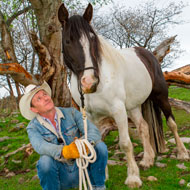
Horses help the recovery of wounded and traumatised servicemen
A severely neglected horse has been given a second chance at life, helping physically and mentally scarred soldiers to reclaim their lives.
Polly was abandoned in a field at just eight months old and became caught in a wire fence. When she was rescued by World Horse Welfare, the wire had cut down to the bone on one hind leg and she was in a state of exhaustion, hardly able to stand.
On top of this, the underweight horse was suffering from a worm infestation and painfully cracked and overgrown hooves.
After making a full recovery, she was chosen to join Horseback UK - a charity that helps injured and severely traumatised UK servicemen to recover.
Its founder Jock Hutchison said: "I wanted to give Polly a second chance and for her not to be written off because she'd been hurt. Yes, there were consequences to her past injury - she was flighty when we first got her, but she needed time that's all."
Now, Jock says Polly has the ability to detect the servicemen who are most in need of help. "She is drawn to the people who have been hurt the most - it's amazing," he said.
Jock, a former marine, believes horses can help servicemen to reclaim their confidence, dignity and in some cases their mobility.
"When you have been a patient for years, your mental and physical state changes because all your needs are attended to," he explained.
"What we aim to do, with the aid of our horses, is to help those patients take back control and become a leader again. These guys were very good leaders, so their natural leadership skills are there, they've just taken a knock.
"We get them to take the lead of a horse, an animal that needs to learn to trust you before you can get him to do anything, and this gets them thinking about leading again and how to deal with people too."
One wife of an ex-serviceman commented on the effect HorseBack has had on her husband: "Thanks to the horses at HorseBack UK, my husband has had his first decent night's sleep in years...
"What has been given to me is hope - hope that I'll get some of my old husband back, hope that he'll find some peace and most of all hope that we can have a future together."
As a result of the charity's work, the ex-servicemen and women who have gone through HorseBack UK now work with 16 different oil companies and other organisations, teaching executives how to be great leaders.
Image courtesy of World Horse Welfare



 The BSAVA has opened submissions for the BSAVA Clinical Research Abstracts 2026.
The BSAVA has opened submissions for the BSAVA Clinical Research Abstracts 2026.